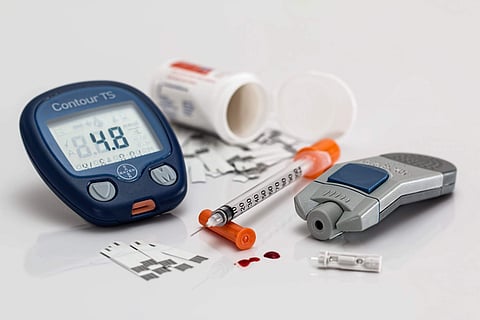

COIMBATORE: The Tamil Nadu health department and National Health Mission will introduce a Standard Operating Procedure (SOP) in June for the treatment of children diagnosed with Type 1 diabetes.
According to health department officials, around 2,600 children have registered and are receiving treatment for Type 1 diabetes in government hospitals across the state. This number may be higher in the private sector, officials said.
"In the light of such a high number of children receiving treatment for Type 1 diabetes, we held a meeting and decided to involve stakeholders and NGOs to better support patients. We plan to launch the SOP in June, which will provide detailed instructions to guide effective treatment. After staff, including doctors and paramedics, are trained, the SOP will be officially implemented. Treatment to Type1 diabetes is already available in all government medical college hospitals across the state. The SOP will ensure dedicated support to children," said A Arun Thamburaj, Mission Director of National Health Mission - Tamil Nadu.
Additionally, he said plans are afoot to extend the service of the 104 help line to connect needy patients with health care staff and to coordinate efforts through dedicated nodal officers.
Dr Krishnan Swaminathan of Idhayangal Trust in Coimbatore, which offers medical assistance to around 2,600 children with Type 1 diabetes across the state, said the government is making significant efforts to address the requirements of the children.
"We estimate there could be more than 10,000 children diagnosed with Type 1 diabetes in Tamil Nadu, and the number may be increased by 500-600 annually. Common symptoms include polyuria (frequent urination), polydipsia (excessive thirst), and polyphagia (increased hunger), along with other signs such as persistent weight loss. Unlike regular diabetes, Type 1 diabetes is more dangerous, as delays in treatment can lead to kidney failure, blindness, coma and death," he said.
"Patients must take life-long insulin shots (four times a day) and undergo glucose tests frequently. The monthly cost for this treatment exceeds Rs 6,000. Strengthening treatment procedures at government hospitals will significantly benefit patients from economically weaker sections. Also, they would have been kept monitoring as they need emergency treatment at anytime. So the helpline is must to address their needs," he added.
Type 1 diabetes is characterised by the destruction of insulin-producing beta cells in the pancreas. Affected individuals require insulin for survival. The condition primarily impacts children and young adults.
Sensing the absence of a nationwide T1DM registry as it was difficult to estimate exact number of patients, the Tamil Nadu health department with the support of National Health Mission - Tamil Nadu, has launched a registry in 2024 for surveillance studies.
The initiative will also improve health care system with the aim of providing minimal care to all the Type-1 diabetes patients.